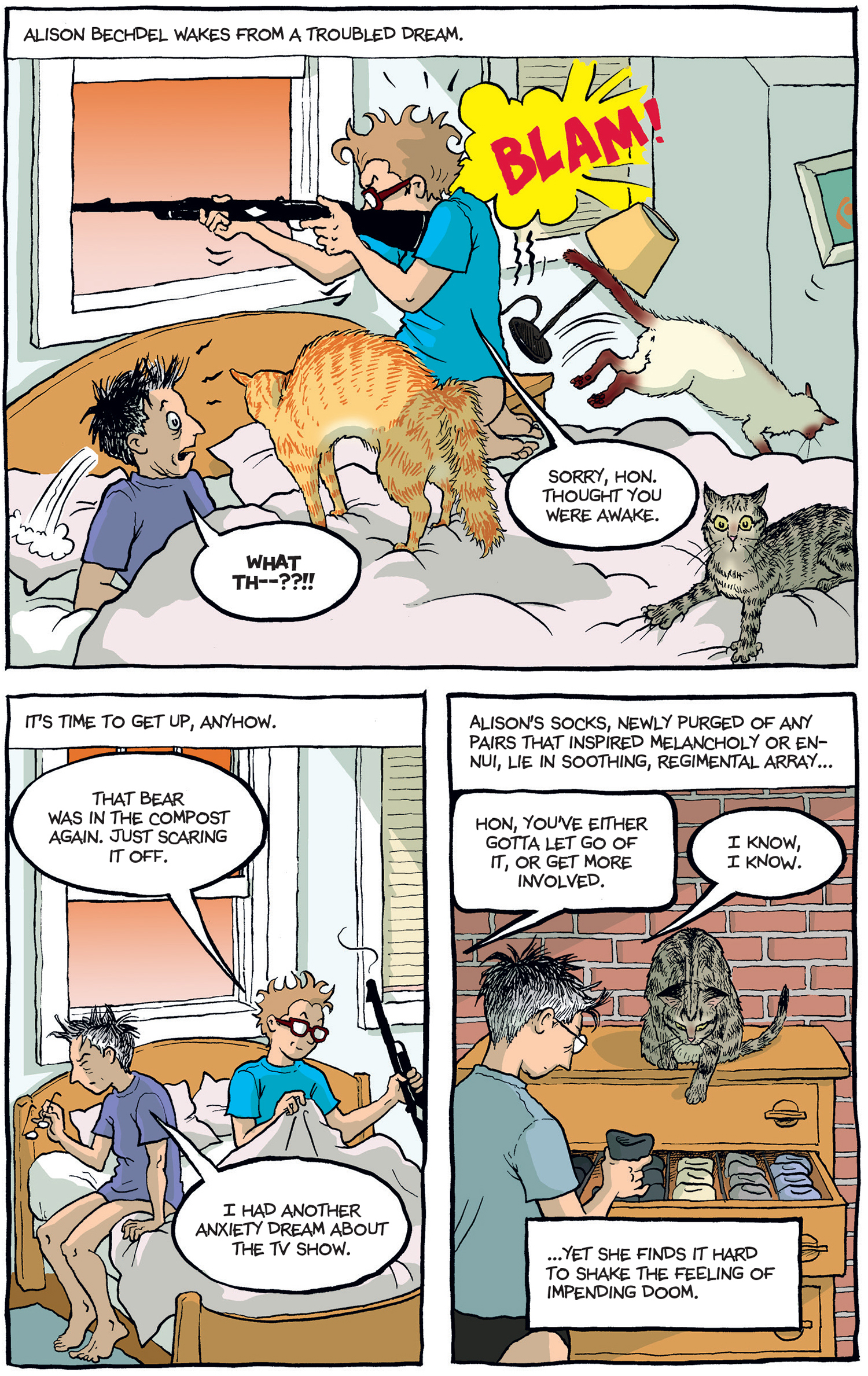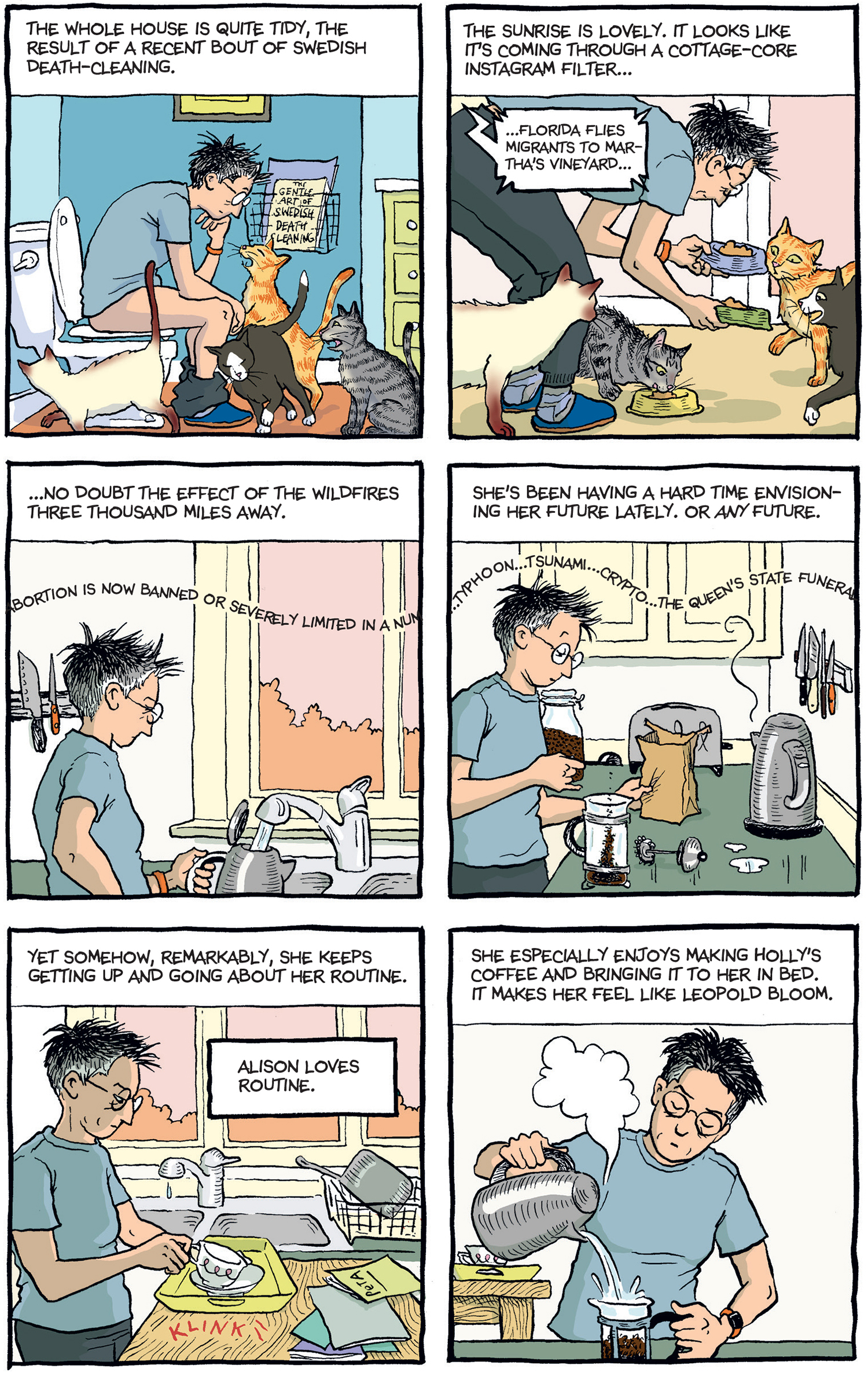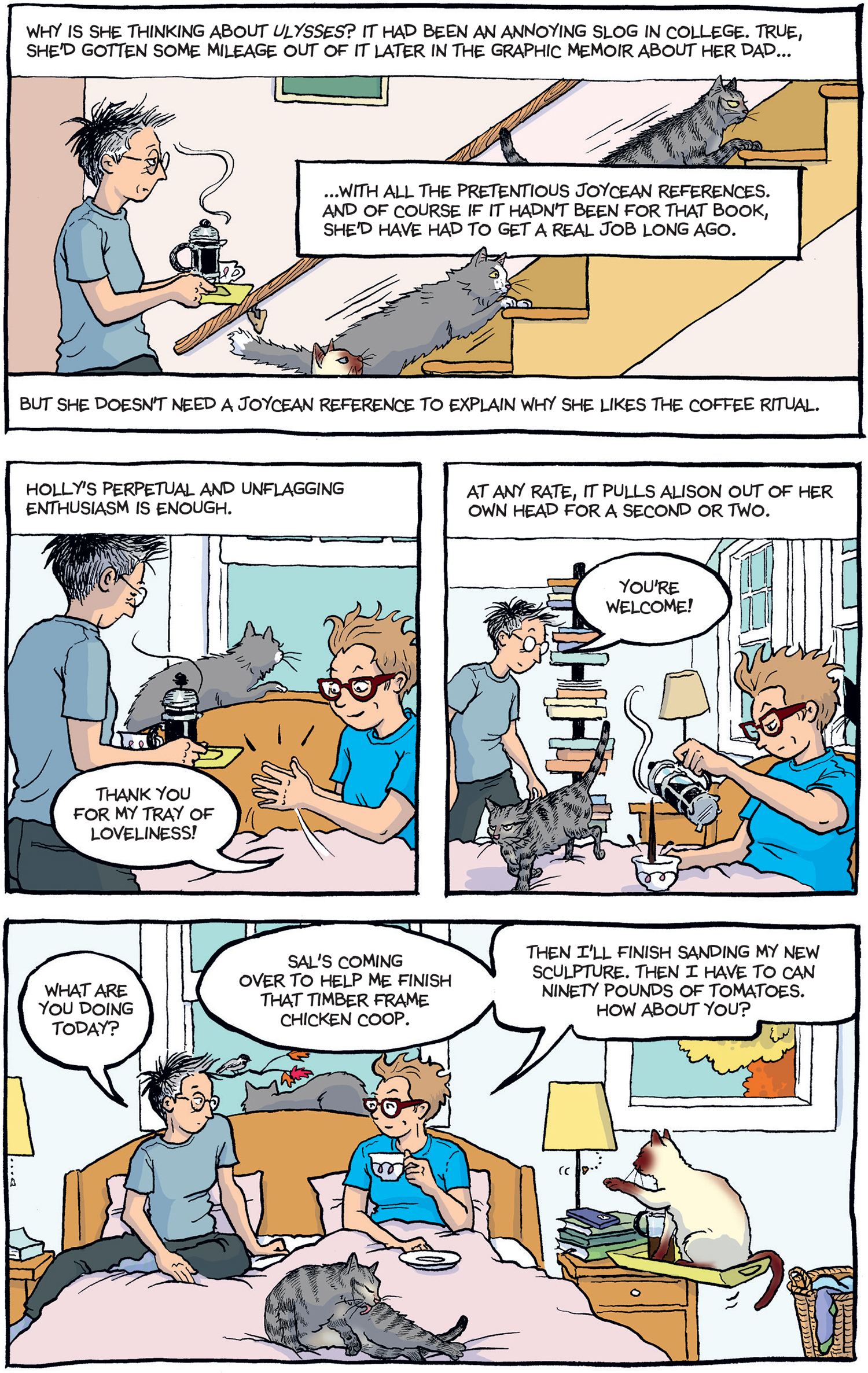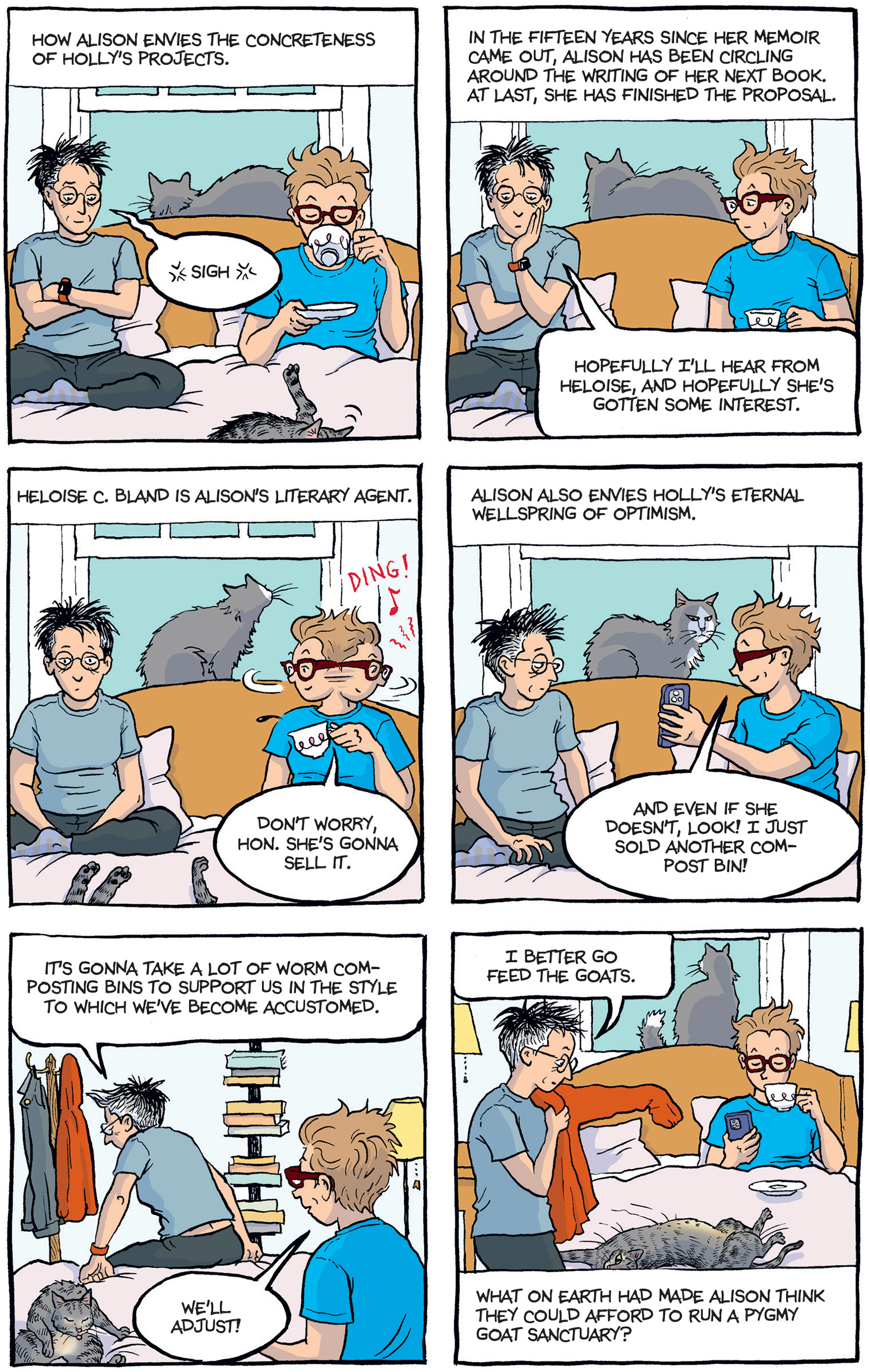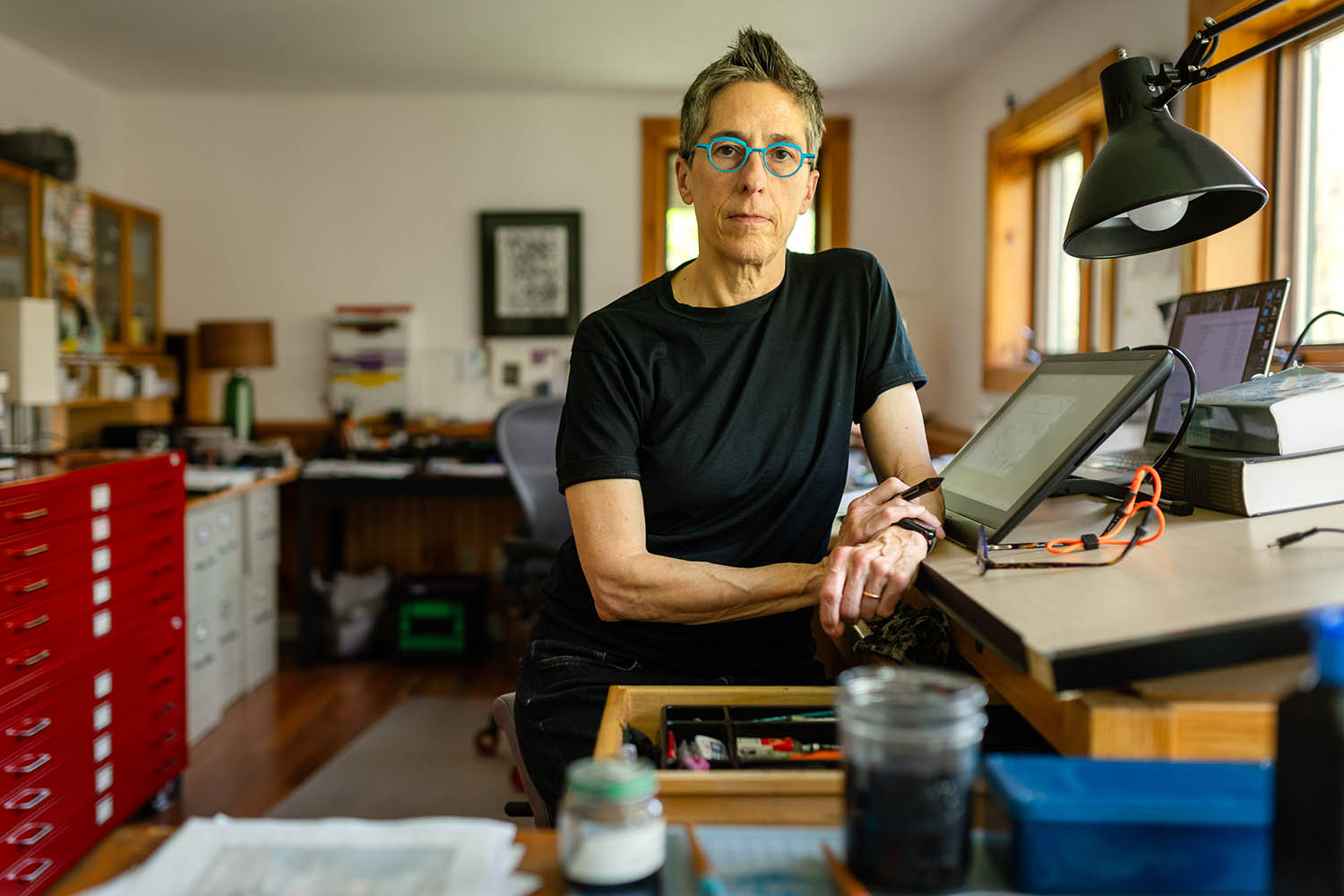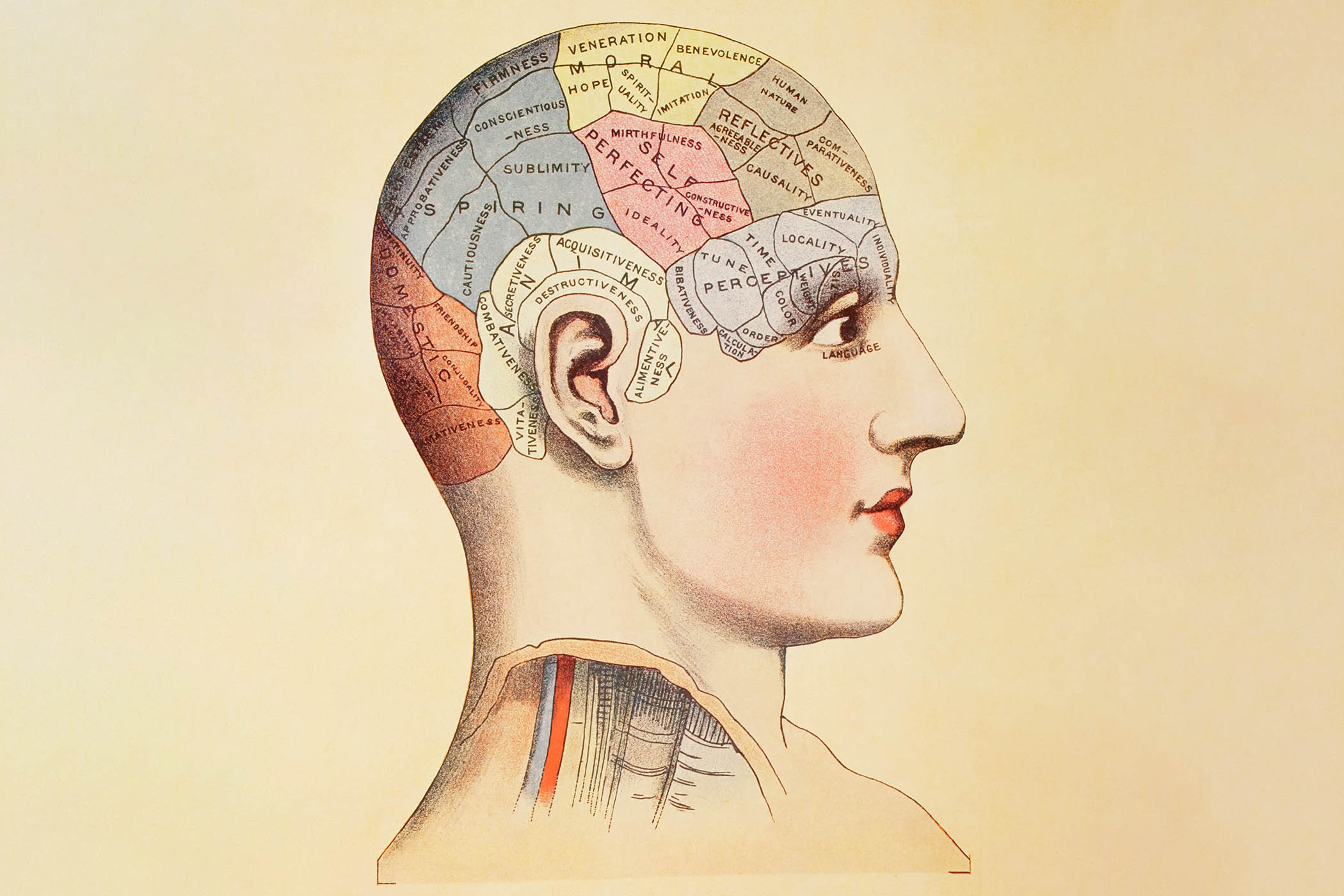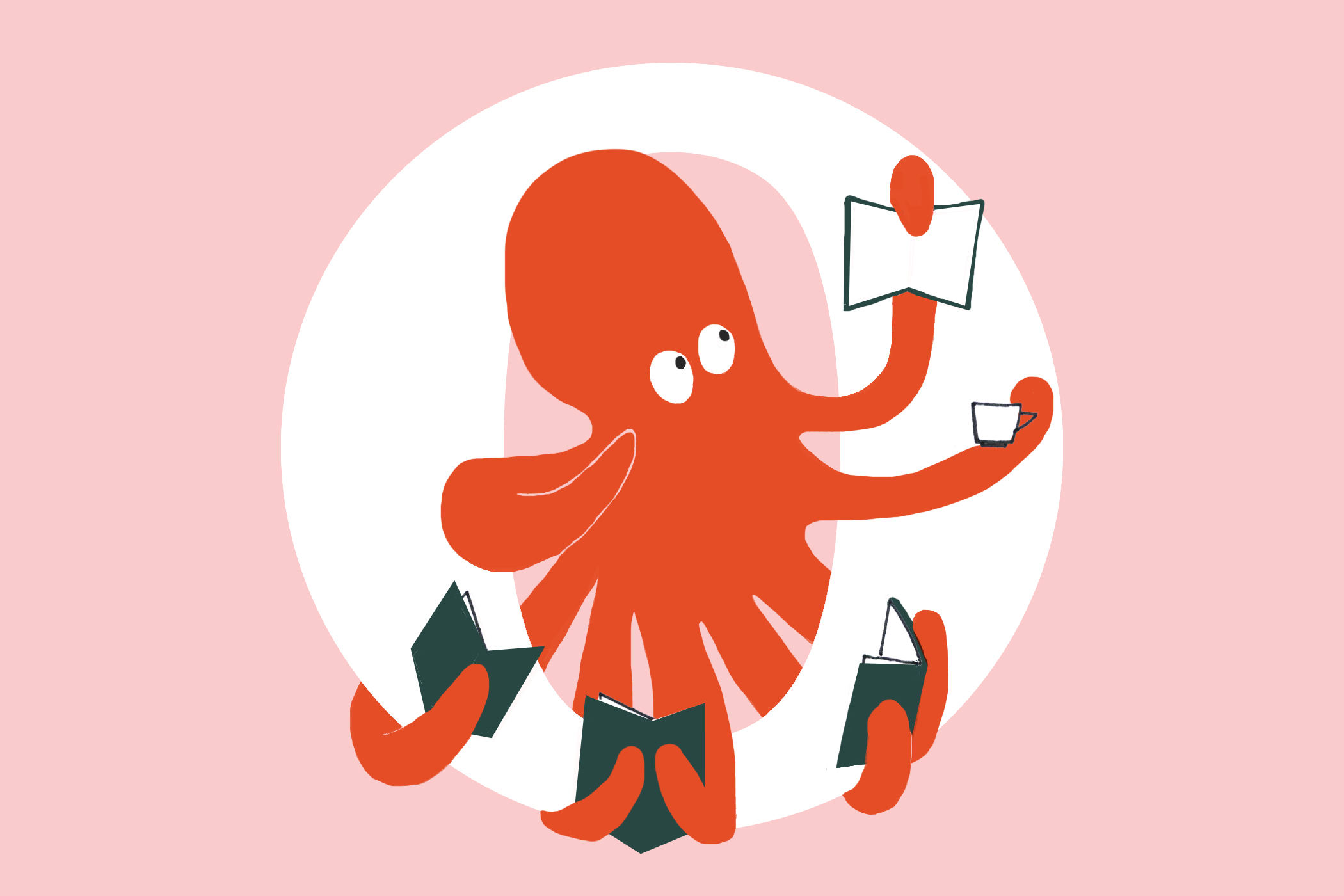Portrait by Oliver Parini
Sometimes – whisper it – even the best of writers begins to tire of the sound of their own voice. In 2022, as the Covid-19 pandemic entered its final stages, the cartoonist Alison Bechdel, author of a series of celebrated graphic autobiographies, began thinking about what she might do next.
“I write about the self,” she says. “So of course I was thinking about a new book as yet another memoir. It would be like all my other memoirs: a serious book. But its subject would be money. I thought it would be interesting to look at my relationship with money and privilege; to write about what it’s like to live with capitalism at the same time as trying to fight against it. But when I sat down to start writing, I just felt bored, so utterly bored. I couldn’t face it! I didn’t want to read Marx, like, really, really carefully. I didn’t want to do all that research!”
But then something happened. Into her mind floated an avatar. “I thought: what about if, instead of writing a memoir about money, I wrote about a cartoonist named Alison Bechdel who’s trying to write about money?” The two Alisons, while not precisely the same person, would have a lot in common. Like her creator, this Bechdel would live deep in the Vermont countryside with her partner, Holly, an artist and compost maven; she, too, would be middle-aged, a workaholic, and in possession of diverse anxieties, political and otherwise.
But there would also be certain differences. While the real Bechdel made her name with the bestselling Fun Home, a memoir about her closeted undertaker father that went on to become a Tony award-winning Broadway hit, her fictional counterpart had risen to prominence on the back of Death and Taxidermy, a book that had since been turned into a “Schmamazon Original” TV show starring – hell, why not go for it? – Aubrey Plaza as Alison, Benedict Cumberbatch as her father, and Sarah Paulson as her mother. Blam! as a classic comic might put it. Suddenly, the road ahead was brightly lit. “It all just came alive,” she says. “Everything fell into place, and it was lovely.”
The result is Spent, the funniest, most satirical cartoon she has ever written – as well as, perhaps, the most prescient. Though Bechdel finished it before Donald Trump was re-elected, it speaks to his presidency nonetheless. “I can’t quite believe that I went to bed on election night,” she tells me, with a grimace. (She’s talking to me from her workroom in Vermont, surrounded by drawing boards, pens and pencils, and beyond them, acres of forest.) “I guess I thought people weren’t going to vote for the lunatic. And it does now feel quite insane and terrifying here. But I have to say there’s also a little glimmer of hope. Maybe this is what it takes to get to the bottom of the structural problems in this country. Maybe we will get our act together now, and resist in a way that we wouldn’t have if Trump hadn’t won.”
Spent comes with an all-singing, all-dancing cast of intensely well-meaning liberals and leftists, as well as a Maga type, in the form of Alison’s sister Sheila, a teacher and seed artist – and somehow, the reader ends up loving each and every one of them. In the end, they’re all good, decent people, whether they’re sporting man buns and talking earnestly of throupledom or, in the case of Sheila, rolling their eyes at Alison’s demand that she turn down the blare of Fox News when she visits (“OK, snowflake,” she says).
Did Bechdel worry about teasing her own side at a time when the US is so divided?
No, not at all – this wasn’t even her plan. “Sometimes, I worry people don’t read my work correctly,” she says. “It might seem to you like I’m taking the piss out of them, but I love these characters. I’m not really critiquing them, so much as celebrating them.”
With their anticolonial Thanksgiving dinners and their fondness for plant-based cheeses, she knows they’re often ridiculous. “But I find them super-endearing.” Such a misreading is, she says, something she has experienced before: ever since her long-running strip Dykes to Watch Out For, in which she appears as a Tintin lookalike called Mo, people have been getting the wrong end of the stick. “Many years ago, in my youth, I got into a relationship with someone who’d known my work before they knew me,” she says. “At one point, we were having a fight about something, an ideological dispute. I said: ‘You knew what I was like when you got involved with me. Why would you be surprised I’m taking this position?’ And she said: ‘I thought you were kidding in your strip! I thought you were making fun of those characters.’”
Newsletters
Choose the newsletters you want to receive
View more
For information about how The Observer protects your data, read our Privacy Policy
And yet, perhaps she protests too much. There’s no ignoring her razor-sharp eye, whether she’s depicting Alison’s annoying young book editor, who cares more about TikTok than for her author’s manuscript, or a hairy middle-aged couple who decide they want to get into polyamory. (When their non-binary, pink-haired student daughter thinks her parents are both having affairs, she’s outraged, but when they reveal they’re in a throuple, she’s thrilled.) Even better are the scenes set in Los Angeles when the fictional Alison pitches a scripted reality TV show based on her new book – a series she intends as a counterpoint to Schmamazon’s Death and Taxidermy, over which she has lost all creative control.
“Ha, yes, well, I guess that was a way for me to play with what might have happened with Fun Home had things been different,” she says. “With the musical, they did a wonderful job. But what if they hadn’t?” For the first time, she laughs out loud. “Alison thinks: I’m going to make a TV show about how to live ethically under capitalism, which is a ridiculous idea. You can’t use a tool of capitalism to explode it!”
Reality TV is, in her eyes, highly disturbing. “It’s why this country is in the terrible mess it’s in! That part of the book is a little roundabout commentary on him [Trump, a star of The Apprentice]. But the fictional Alison also has a nostalgia for the TV she grew up with, when everyone watched the same shows. She has this fantasy that she’ll reach a mass audience with her crazy progressive vision.” Alison may be among Spent’s saner characters but, as we come to understand, even she isn’t free from the delusions and mad convictions that are born of an addiction to social media.
What response has she had to Spent so far? Holly coloured its pages, just as she did Bechdel’s last memoir, The Secret to Superhuman Strength, which meant that she read it as it was drawn. “As soon as I finished a page, I’d consult with her,” Bechdel says.
Does this mean they would sometimes fall out?
“Yes, it does. We had some bad patches. But we got through it.”
What does Holly think of her avatar? (She’s a major character, her wood chopping and goat husbandry videos having turned her into an Instagram influencer.)
“I think she feels OK about it.” Bechdel smiles. “In general, she wishes she had more lines… But in real life, she’s the force that enables me to get things done. She’s this kind of rock that I can gravitate towards, because I’m all over the place.”
As for her friends and those Fox News viewers whom she counts among her own family, they’re only just reading the book now. Is she nervous? Will there be arguments and pained silences?
“No, not really. I just write this stuff. I can’t help what anyone feels about it.”
Again, though, she has been here before. Fun Home and the memoir that followed it, Are You My Mother?, explored the most intimate territory (the latter was about her difficult relationship with her mother, Helen). “Fun Home came out almost 20 years ago,” Bechdel says. “And in a way I think Spent is an effort to cover my own tracks, as well as to joke about what it’s like to have an autobiographical project become a commercial one. I feel like I’ve exposed so much. I don’t regret it. I needed to do it. But I couldn’t have foreseen when I was embarking on Fun Home aged 40 what it would be like to live with that information out in the world for the rest of my life.”
Fun Home the musical could, she says, still become a movie, a prospect that even now seems astonishing. Until she was 40, after all, Bechdel barely made enough to live on: “The irony of it is that the great lure of comics to me as a medium was that it was fringe-y. I didn’t want to compete with fine art or literary writing. I wanted to do something that no one was paying attention to. Only now everyone’s paying attention!” In the past 20 years, graphic novels have moved from the cultural margins to the mainstream, a shift reflected in the fact that Bechdel has recently been appointed a professor at Yale University. (Naturally, there’s a long waiting list for her classes.)
Bechdel, who was born in 1960, grew up in a small town in Pennsylvania, and began drawing as a child. She longed to be a cartoonist – that or a psychiatrist, jobs she had conflated thanks to all the analyst cartoons in the New Yorker. After Oberlin College in Ohio, where she studied art history, German and Greek, she moved to New York, taking on the kind of dreary jobs that allowed her to draw. There, Dykes to Watch Out For was born: a strip about a gang of more-or-less radical lesbians that’s best known now for being the place where, in 1985, the so-called Bechdel test first raised its head, one character having smartly informed another that she only goes to a movie if it has two women in it who discuss something other than a man. (“Pretty strict,” says the second woman. “No kidding,” replies the first. “The last movie I was able to see was Alien…”)
It was Fun Home, though, that proved to be her saviour. By the time she began working on it, all the places she’d published her strip were disappearing – the gay bookstores closing, the underground newspapers folding. It was a huge project: six or seven years’ work combined with some pretty hefty emotional excavation. (Her father, Bruce, who combined teaching high school English with part-time undertaking and the renovation of the family’s gothic mansion, had died beneath the wheels of a truck in 1980 at the age of just 44.)
But the gamble paid off. The book’s references to Proust, Joyce, Radclyffe Hall and others flattered the literary critics, who could see that here, at last, was a cartoonist who could write with the same verve and precision as she could draw. (I‘ve always relished the fact that the book’s New York Times reviewer admitted to having had to look up the meanings of words such as “humectant” and “scutwork”.) Huge acclaim – and huge sales – followed. Suddenly, everything was happening for her: a cameo in an episode of The Simpsons; a $625,000 (£470,000) MacArthur Foundation “genius” grant; a smash hit musical (in this country, it played at the Old Vic in London).
My fantasy is that I’m staving off complete illiteracy by making different kinds of stories
My fantasy is that I’m staving off complete illiteracy by making different kinds of stories
Bechdel has long said that she would not have swapped her strange and uneasy childhood for a happy one. Fun Home would not exist had things been different, and for all their problems, her parents taught her a lot about the pursuit of art (while her father sublimated his desires in a passion for antiques, her mother threw herself into amateur dramatics). But her father was dead when she began work on the book; it was her poor mother who had to deal with the fallout. “She had cancer all through the years I was writing both Fun Home and the memoir about her, and I felt like the worst child imaginable. Here I am, writing about my mother, who’s the most private person in the world. Why am I doing this? I didn’t know if she was going to live to see Are You My Mother? but she did, and it was my gift to her, my attempt to tell her how grateful I was to her, and how much I loved her. I feel grateful she lived to receive that book, and grateful that she didn’t live to see the musical of Fun Home, because I think that would have been too difficult for her.”
What did Helen feel about Are You My Mother?
“She was pretty non-committal. She didn’t really say much at all, except that it cohered.” We both laugh. Mothers! Better not let those daughters get big-headed.
I wonder if she worries about the future of publishing: Spent, with its click-obsessed book editor, suggests that she might. “Well, I worry about everything,” she says, wryly. “So, yes, I do. But I work as a cartoonist. I write these graphic stories. My fantasy is that I’m staving off complete illiteracy by making different kinds of stories – stories that capitalise on people’s visual literacy, which I think we’re becoming more and more sophisticated about. I want to make visual stories that have substance and ideas in them, as a way to keep all that tradition alive.” Her avatar often finds it impossible to focus. Either she’s doomscrolling, or she’s replying to messages that come at her screen like birds. So how’s her own concentration? Is it shot?
“Oh, absolutely. I can’t write anything without Googling something every three seconds. My attention span is infinitesimal. It’s crazy. But I also feel like I’m learning ways to work around those things. I’m of an age not to be super-addicted to my phone, for which I’m grateful.”
Her workaholism continues unabated. But her students have given her a new zest for everything she does. “I feel like a vampire,” she says. “Getting fuelled by their youth and energy.” Her books are at last getting closer together, and she’d love to give Spent a sequel.
What about the US, though? Is she tempted to leave? “I’m definitely starting to research the possibilities,” she says. “But it seems like it’s hard to do. I’m jealous of these wealthy celebrities who just go wherever they want.” Exercise helps when it comes to a sense of perspective. Today, she’ll head out on her first bike ride of the season. “Actually, I just had a wonderful ski vacation in Finland,” she says. “I’ve gotten very into Tove Jansson in recent years, so it was very nice to be in Moominland, 14 hours north of Helsinki, up above the Arctic Circle. I’d love to move there if they’d have me.” A pause, and then a frown. “But yeah… Putin is right next door.” The thought hangs in the air, like a speech bubble.
Spent by Alison Bechdel is published by Jonathan Cape (£20). Order a copy at observershop.co.uk to receive a special 20% launch offer. Delivery charges may apply.
One fine morning… pages from Spent by Alison Bechdel
